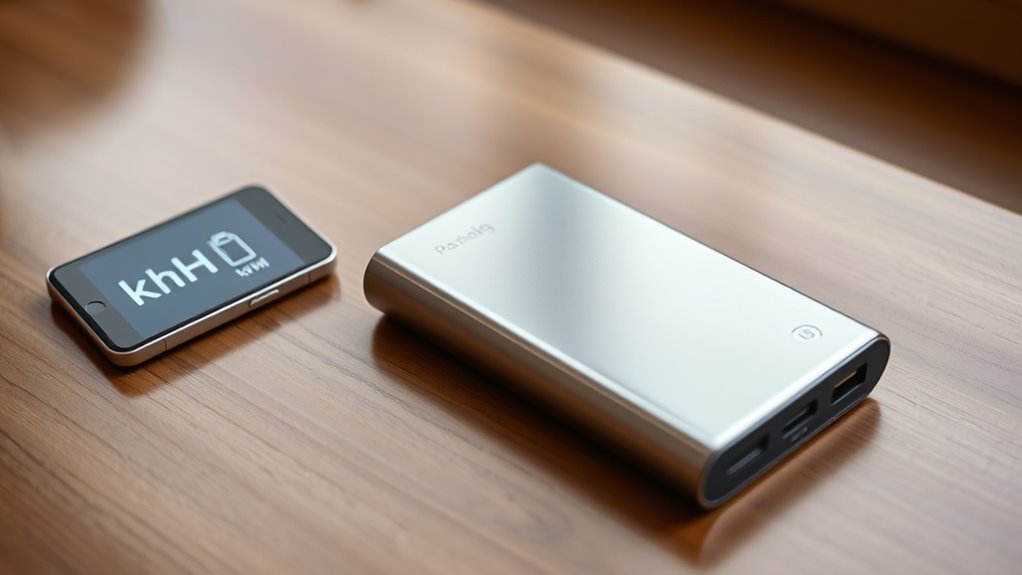Kilowatt-hours (kWh) measure energy used over time, showing how much power is consumed or stored. Think of it as how long a device can run on a certain power capacity. For example, a 1 kWh battery can power a 100-watt device for about ten hours. Understanding kWh helps you compare portable power sources and estimate run times. When you explore further, you’ll gain even more insights into managing your energy needs efficiently.
Key Takeaways
- Kilowatt-hour (kWh) measures the total energy used or stored over time, representing power consumption or capacity.
- 1 kWh equals using 1,000 watts for one hour, indicating energy output or usage.
- In portable power, kWh helps compare the energy capacity of batteries and power systems.
- Understanding kWh allows accurate estimation of device runtime and energy needs.
- kWh is essential for assessing efficiency and suitability of portable power sources for specific applications.

Understanding the key terms related to power is essential whether you’re studying political influence, organizational dynamics, or energy systems. When it comes to portable power, grasping concepts like battery capacity and voltage ratings helps you make informed decisions about how much energy a device can store and deliver. Battery capacity refers to the total amount of energy a battery can hold, typically measured in watt-hours (Wh) or sometimes in amp-hours (Ah). This metric tells you how long your device can run before needing a recharge. For example, a larger battery capacity means your portable device, like a power bank or a solar generator, can supply power for a longer period.
Voltage ratings are equally important because they indicate the electrical potential difference that a battery or power source provides. They determine how much voltage your device requires and whether the power source is compatible. If your device needs a specific voltage, using a power bank with an improper voltage rating can lead to inefficient performance or even damage. Understanding both battery capacity and voltage ratings allows you to select a portable power solution that matches your device’s requirements, ensuring safety and maximum performance.
Voltage ratings ensure compatibility and safe performance of portable power sources.
Now, shifting to what a kilowatt-hour (kWh) actually means helps you better understand energy consumption in practical terms. A kilowatt-hour is a measure of energy equivalent to using one kilowatt (kW) of power over one hour. Think of it as the amount of energy used by a household appliance, like a refrigerator, over a specific period. When you see a portable power station rated in kWh, it indicates how much energy it can store and supply before needing a recharge. For instance, a 1 kWh battery could theoretically power a 100-watt device for about ten hours, assuming perfect efficiency.
Knowing what a kWh means also helps you compare different portable power sources and estimate how long they’ll support your devices. If you’re planning a camping trip or preparing for an emergency, understanding these measurements ensures you pick a power source capable of meeting your needs. It’s all about matching your device’s energy demands with the capacity of your power source, which hinges on understanding both battery capacity and voltage ratings. Additionally, the efficiency of energy transfer plays a role in actual runtime, affecting how much usable power you get from your system. This way, you’re not left guessing how long your devices will last or whether your power solution is adequate. In the end, being familiar with these terms makes you a smarter consumer and a more confident user of portable power systems.
Frequently Asked Questions
How Does KWH Compare to Other Energy Measurement Units?
When comparing kWh to other energy measurement units, you see it’s a standard for quantifying electricity consumption over time. Unlike joules, which measure energy in smaller, more precise amounts, kWh makes it easier for you to understand larger energy use, like household bills. Measurement standard differences matter because they help you interpret energy data accurately, ensuring you grasp how much power you consume or produce, depending on the unit used.
Can KWH Be Used to Measure Renewable Energy Production?
Did you know that in 2022, renewable energy sources supplied about 29% of global electricity? You can definitely use kWh to measure renewable energy production, as it’s a standard unit for energy output. When comparing kWh vs renewable sources, it helps quantify how much energy your solar panels or wind turbines generate. This makes kWh a practical tool for tracking your renewable energy measurement and evaluating efficiency.
What Appliances Consume the Most KWH in a Household?
You should know that appliances like central air conditioning, electric water heaters, and refrigerators consume the most kWh in your household. These high-energy devices often have lower energy efficiency and higher appliance ratings, meaning they use more power. To reduce your overall kWh consumption, focus on upgrading to more energy-efficient models and maintaining appliances regularly to optimize their ratings, helping you save on electricity bills.
How Can I Reduce My KWH Energy Consumption?
They say, “A penny saved is a penny earned,” and that applies to your energy bills too. To reduce your kWh consumption, try energy-saving tips like turning off unused appliances, switching to LED bulbs, and unplugging devices. Install a smart meter to track usage and identify high-consuming appliances. These steps help you save money and understand your energy habits, making it easier to cut costs and be eco-friendly.
Is KWH Used Internationally or Only in Specific Regions?
You’ll find that kWh is used internationally, not just in specific regions. Different countries follow their regional electricity standards, but kWh remains a universal unit for measuring energy consumption. It’s also crucial in international energy trade, helping compare electrical usage across borders. So, no matter where you are, understanding kWh helps you grasp energy use and costs, making it an indispensable term worldwide.
Conclusion
So, next time you see “kWh,” remember it’s just a fancy way of saying how much juice your device drinks. Ironically, understanding these terms might just make you more aware of how quickly your gadgets drain your batteries—yet somehow, we still keep pushing them to the limit. Who knew that a simple acronym could remind us that, despite all the tech, we’re still at the mercy of power’s unpredictable flow? Isn’t that just powerfully ironic?









